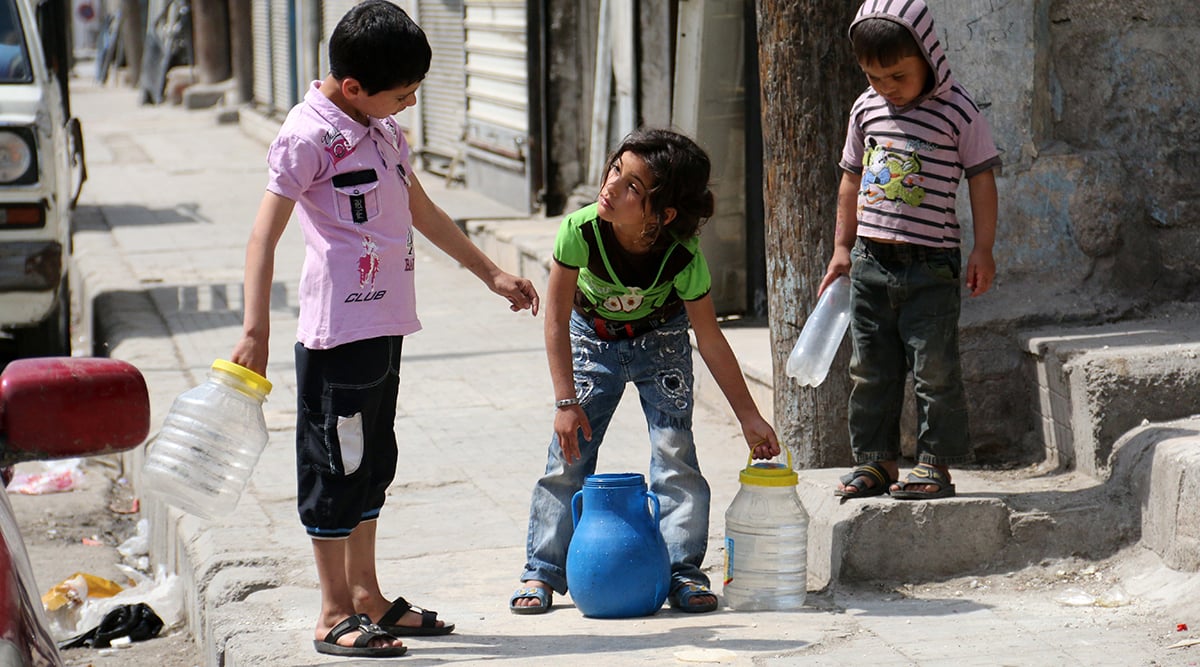 Aleppo gets it water supply through Al-Khafsa and Al-Babeery stations which are in the eastern countryside, controlled by ISIS since the beginning of February 2014. The two stations have stopped before on Sunday and Monday 20-21 April, 2014when the Public Establishment for Transmission Electricity, which is affiliated to the Syrian government, abstained fromproviding the necessary electrical power to launch the engines.However it resumed its operations quickly after talks between the government on one side, and the Red Crescent and some of Aleppo people on the other side.
Aleppo gets it water supply through Al-Khafsa and Al-Babeery stations which are in the eastern countryside, controlled by ISIS since the beginning of February 2014. The two stations have stopped before on Sunday and Monday 20-21 April, 2014when the Public Establishment for Transmission Electricity, which is affiliated to the Syrian government, abstained fromproviding the necessary electrical power to launch the engines.However it resumed its operations quickly after talks between the government on one side, and the Red Crescent and some of Aleppo people on the other side.
In order to supply water to Aleppo residentsthe main pumps must work, the pump in Soliman Al-Halabi neighborhood is the biggest and most important. All of these pumps require considerable electrical power to function properly. On Friday 18/4/2014, The ShariahBorad,affiliated to the armed opposition, has hadthe electricity supply cut offto Aleppo city entirely in both the rebel-held areas and the areas that are under the Syrian regime control. Al-Sharia stated that:
“The Syrian government forces have to stop its daily shelling with barrel bombs and rockets against the rebel-held residential areas.The Sharia Board in returnwill have the power supply resumed.”
The engines kept working on the standby generators that are powered by diesel, which caused the water to reach once every three days.
From Sunday 27/4 until Friday 2/5, the electrical engines worked again intermittently, and stopped on Friday because of the barrel bomb shelling on the road between Al-Kindi hospital and Al-Owayja village,the shelling destroyed the main water pipe, and water was everywhere in the streets until it reached Al-Jandool square. The workmen of the water institute and the Red Crescent organization, with the help of some residents, fixed the destroyed pipe and the water supply resumed on the next day, 3/4/2014.
On the next day, 4/4/2014, General Administration of the Services,affiliated toJabhat Al-Nusra and Al-Sharia Board of the armed opposition decided to stop the engines of Solaiman Al-Halabipumps causing the ceasing of the water supply to Aleppo entirely in both the rebel-held areas and the areas under the Syrian government control.
FadelAbd-Al-Ghany, head of SNHR, says:
“Cutting off water supply to the residential areasto gain military advantage rises to be a war crime.Thisunacceptable criminal act puts the lives of about 2 million people at jeopardy. Respecting the basic human rights in the rebel-held areas is fully the responsibility of the rebels.”
SNHR contacted with one of the people of Al-Sha’ar neighborhood, a neighborhood under the armed opposition control, he offered the network his testimony:
“Since the end of April,the water supply situation in Aleppo is worsening. The water supplyare being cut-off along with a frequent electricity outages, and with the beginning of May it got worse, as the water has been cut offfor more than eight days.
“Both the regime forces and the FSA are accusing each other, but in fact we’re living a disastrous situation after our water supplies ran out.Currently our only way of getting water is the wells where we stand in long lines to have a little of it.”
Drinking water isn’t available anymore. We’ve bought tanks and containers, the water it contain is probably unhealthy and it is also very costly.”
Mr. Ibrahim Falah, living in Al-Shahba neighborhood, under the control of the Syrian government forces has talked to SNHR about theliving situationwith the water supply cut-off:
“The crisis has begun after the water supply has been cut off for more than eight days in some neighborhoods and more than 11 in others.”
The prices of the mineral drinking water have become four times its original price, also the water for daily uses are coming now in 20-lites containers that cost 6500 pound. Some of the containersthat were used to transferhydrocarbons are being used now to transfer water after painting its interior with a special material, I don’t know if that’s really safe. Some of the people depend now on wells where hundreds of people are standing in lines waiting their turns. We’re on the verge of a humanitarian disaster in every sense of the word.”


